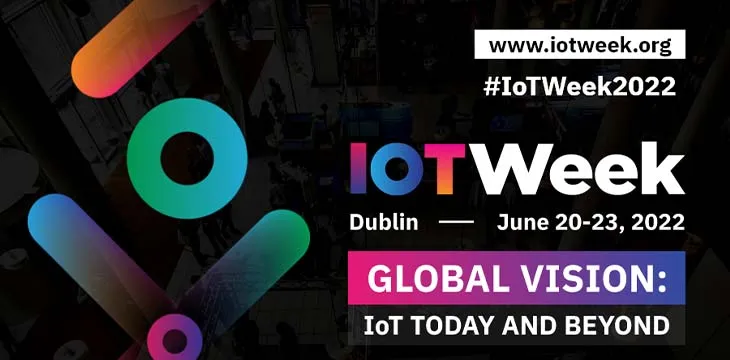|
Getting your Trinity Audio player ready...
|
One of the big themes at the Global IoT Summit in Dublin this week was how blockchain technology would integrate with IPv6 and other technologies to usher in a new era of transparency, connectivity, and communication.
On day two, Latif Ladid, Ralph Wallace, Pascal Thubert, and Chongfeng Xie discussed the future of IPv6 and what it will mean for the world. The panel shed light on what IPv6 is, why it matters, and how it will work symbiotically with Bitcoin to enable true end-to-end transactions.
Introducing the panelists:
- Latif Ladid is the Founder and President of the IPv6 Forum. He’s passionate about IPv6 and has been pushing its rollout for over 20 years. He’s the moderator of this panel.
- Ralph Wallace is the IPv6 Lead at Verizon Public Sector. He also has extensive experience dealing with departments in the United States government, including the IRS, and assisting with their IPv6 upgrades.
- Pascal Thubert is the R&D Principal Engineer at CISCO. He works in the Chief Technology and Architecture Office, focusing on products and standards in the context of IPv6.
- Chongfeng Xie works in the research center at China Telecom in Beijing. He’s a former visiting scholar at UCLA and is now a full-time researcher and academic.
Ralph Wallace on IPv6 in the United States
Wallace tells us that today, about 50% of the visitors using the IRS website are using IPv6. He says it’s a slow and steady adoption that is now speeding up, thanks partly to a concerted effort by various government departments to make it a priority. Wallace tells us that the federal government sees it as a security issue and now requests various departments to report on their progress towards upgrading to IPv6. At this pace, he sees 20% adoption by the end of 2023.
One of the key challenges to getting companies to adopt IPv6 is the capitalist profit incentive, according to Wallace. One of the biggest hurdles to convincing them to adopt it is showing a positive return on investment, and now that it’s possible to demonstrate this thanks to better data, he sees it speeding up in the coming years. Wallace says that IPv6 can save businesses tens of millions of dollars per year.
Chongfeng Xi tells us about IPv6 in China
Xi is next, telling us that IPv6 is being adopted rapidly in China. The pace at which it is being adopted has increased since 2017, and he estimates that it has around 50% penetration right now. Furthermore, IPv6 web traffic in China has surpassed IPv4 traffic for popular services like YouTube, Alibaba, etc.
Ladid has spoken before about how China is one of the world leaders when it comes to IPv6 adoption. Chongfeng’s presentation confirms this.
Pascal Thubert explains the enhanced capabilities of IPv6
Thubert tells us that, many years back, he and his team were able to have a full end-to-end telephone call using IPv6 in France. He explains that, beyond 100 nodes, IPv4 will start to fail but that IPv6 can handle thousands or even tens of thousands of devices in a single subnet, speeding up the move toward the Internet of Things (IoT). Clearly, widespread adoption of IPv6 is crucial if the IoT becomes a reality.
What does all of this have to do with Bitcoin?
While he wasn’t speaking on this particular panel, I got a chance to ask Dr. Craig Wright what the benefits of IPv6 with Bitcoin are versus how it would work without it. He told me that the two complement each other.
“They have a symbiotic relationship,” he said, explaining how Bitcoin enables commercialization on IPv6 while IPv6 enables end-to-end communication on Bitcoin.
As far back as 2014, Dr. Wright publicly spoke about how Bitcoin was IPv6 compatible. He designed it with IPv6 in mind, and this connection has fostered a budding relationship between himself and Ladid as the pair discuss the two technologies and the possibilities they open up. Ladid has described Bitcoin as a “missing piece” and that now that it exists, he has high hopes for more widespread IPv6 adoption.
In this documentary, Dr. Wright explains how Bitcoin was always meant to enable something like the Internet of Things and how it is compatible with IPv6.
As Wallace alluded to earlier in the panel, one of the biggest impediments to IPv6 adoption has been companies’ concerns with return on investment. However, now that a scalable micropayments technology exists in Bitcoin, they’ll likely figure out new business models that will only become possible when they fully embrace IPv6, making it worthwhile to invest in the necessary infrastructure. Likewise, scrappy startups within the Bitcoin ecosystem might beat them to the punch, pressuring them to embrace IPv6 and Bitcoin or lose revenue.
While it’s impossible to predict the exact course the future will take, one thing is for sure: Bitcoin and IPv6 fit together like hand and glove, and they’re going to revolutionize entire industries. As Ladid and Dr. Wright make key players like those on this panel aware of the possibilities, there’s no telling what they might discover or what innovations they might bring about.
Watch: Dr. Craig Wright’s keynote speech: A Better Internet with IPv6 and BSV Blockchain at the BSV Global Blockchain Convention
https://www.youtube.com/watch?v=EdhD4sRrHPs

 07-05-2025
07-05-2025 





